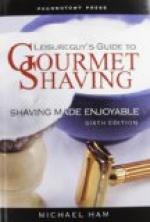For the first time since she began her story Jed uttered a word.
“Sho!” he exclaimed. “Sho, sho! Dear me! The poor young feller!”
She looked up at him quickly. “Thank you,” she said, gratefully. “Yes, he was sent to prison. He was calm and resigned and very brave about it, but to me it was a dreadful shock. You see, he had taken so little money, not much over two thousand dollars. We could have borrowed it, I’m sure; he and I could have worked out the debt together. We could have done it; I would have worked at anything, no matter how hard, rather than have my brother branded all his life with the disgrace of having been in prison. But the man for whom he had worked was furiously angry at what he called Charlie’s ingratitude; he would teach the young thief a lesson, he said. Our lawyer went to him; I went to him and begged him not to press the case. Of course Charlie didn’t know of my going; he never would have permitted it if he had. But I went and begged and pleaded. It did no good. Why, even the judge at the trial, when he charged the jury, spoke of the defendant’s youth and previous good character. . . .”
She covered her eyes with her hand. Poor Jed’s face was a picture of distress.
“Now—now, Mrs. Armstrong,” he urged, “don’t, please don’t. I—I wouldn’t tell me any more about it, if I was you. Of course I’m— I’m proud to think you believed I was worth while tellin’ it to and all that, but—you mustn’t. You’ll make yourself sick, you know. Just don’t tell any more, please.”
She took her hand away and looked at him bravely.
“There isn’t any more to tell,” she said. “I have told you this because I realized that Barbara had told you enough to make you imagine everything that was bad concerning my brother. And he is not bad, Mr. Winslow. He did a wrong thing, but I know—I know he did not mean deliberately to steal. If that man he worked for had been—if he had been— But there, he was what he was. He said thieves should be punished, and if they were punished when they were young, so much the better, because it might be a warning and keep them honest as they grew older. He told me that, Mr. Winslow, when I pleaded with him not to make Charles’ disgrace public and not to wreck the boy’s life. That was what he told me then. And they say,” she added, bitterly, “that he prides himself upon being a staunch supporter of the church.”
Jed let go of his knee with one hand in order to rub his chin.
“I have queer notions, I cal’late,” he drawled. “If they wasn’t queer they wouldn’t be mine, I suppose. If I was—er—as you might say, first mate of all creation I’d put some church folks in jail and a good many jail folks in church. Seems’s if the swap would be a help to both sides. . . . I—I hope you don’t think I’m—er— unfeelin’, jokin’, when you’re in such worry and trouble,” he added, anxiously. “I didn’t mean it.”




